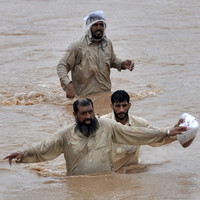Pakistan Flood Toll Exceeds 1,500 as Officials Struggle to Reach Survivors

Pakistan’s deadliest floods in decades killed more than 1,500 people and overwhelmed government efforts to provide aid, officials and relief workers said.
With President Asif Ali Zardari touring Europe, the government said it was rushing help to the devastated northwestern province, where the army has fought Taliban guerrillas. Islamic militant groups in the region and the U.S. government both have built public support in the past by providing assistance to bolster government attempts.
Monsoon rains will continue for the next few days after ripping out bridges, roads and villages since late last week, said Nasir Khan, a Meteorological Department official in the provincial capital, Peshawar. Regions downstream in the Indus River valley, where most of Pakistan’s 162 million people live, braced for floods that may damage crops, according to the nation’s biggest agriculture body.
More than 1,500 people have died in Pakistan’s northwestern province, Khyber Pakhtunkhwa, said Noor Muhammad, a press officer for the provincial development ministry.
Government and private relief agencies are managing to provide “only 5 percent of what’s required,” Mujahid Khan, provincial spokesman for the Edhi Foundation, which runs Pakistan’s largest ambulance and rescue services, said by phone from Peshawar.
Pakistani television channels showed flood survivors gathered at roadsides, seeking transport to nearby towns.
Army Rescue
Pakistani soldiers in the flood-scoured Swat Valley “are rescuing people from the water by helicopter,” said Zahid Khan, 55, president of the hotel association in Mingora, the valley’s main town. “But the government has sent no help for people who lost their homes and they are camping wherever they can with no drinking water,” he said by phone.
Islamic militant activists distributed aid packages in the northwestern town of Charsadda, outside Peshawar, the Associated Press reported. An earthquake in 2005 that killed about 86,000 people exposed the government’s inadequacy in providing relief as the U.S. and Islamic militants raced to fill the gap.
U.S. Air Force cargo planes landed in the city of Rawalpindi yesterday with food packages as part of $10 million in emergency help pledged by Secretary of State Hillary Clinton. She has sought to boost her country’s image among Pakistanis as an opinion survey released last week by the Pew Research Center in Washington showed only 17 percent of the local population had a positive view of the U.S.
U.S. Aid
The U.S. is rushing helicopters, boats, pre-fabricated bridges, mobile water treatment units and food supplies to affected areas, Clinton said in a statement yesterday.
Food distribution has begun in the worst affected districts of Peshawar, Nowshera and Charsadda, the World Food Program said yesterday on its website. Floodwaters “have also caused significant damage” to the UN agency’s warehouses in northwestern Pakistan, it said.
The flood’s death toll may rise to 3,000, said Edhi Foundation’s Khan. He spoke from Peshawar, the capital of Khyber-Pakhtunkhwa, previously called the North-West Frontier Province.
Officials in Pakistan’s other provinces -- Punjab, Sindh and Baluchistan -- braced for the floodwaters moving down the Indus River and its tributaries. The Sindh government ordered residents evacuated from locales along the Indus.
Crop Damage
The floods, which according to U.K. charity Oxfam may be Pakistan’s worst in 35 years, may cut the production of rice, sugarcane and corn by about 10 percent to 15 percent, said Nasir Cheema, president of Pakistan’s Chamber of Agriculture.
Pakistani television networks showed survivors clinging to trees or debris in muddy, raging mountain rivers. Armed forces chief Ashraf Pervez Kayani yesterday visited flooded areas of the Swat Valley and his helicopter evacuated 17 residents, the army said on its website.
Opposition leader Nawaz Sharif, a two-time prime minister, criticized Zardari for pursuing a trip to France and the U.K. this week. His absence flies in the face of “the worst flooding in the country’s history,” Sharif said on the GEO television news channel.
Prime Minister Yousuf Raza Gilani, who toured the stricken province by air, ordered the government to provide food to people at safe locations.
The floods followed the deaths of 152 people when a plane crashed in heavy rain near the capital, Islamabad, on July 28.
To contact the reporters on this story: Anwar Shakir at ashakir1@bloomberg.net; Farhan Sharif in Karachi at Fsharif2@bloomberg.net
©2010 BLOOMBERG L.P. ALL RIGHTS RESERVED To subscribe or visit go to: http://www.bloomberg.com